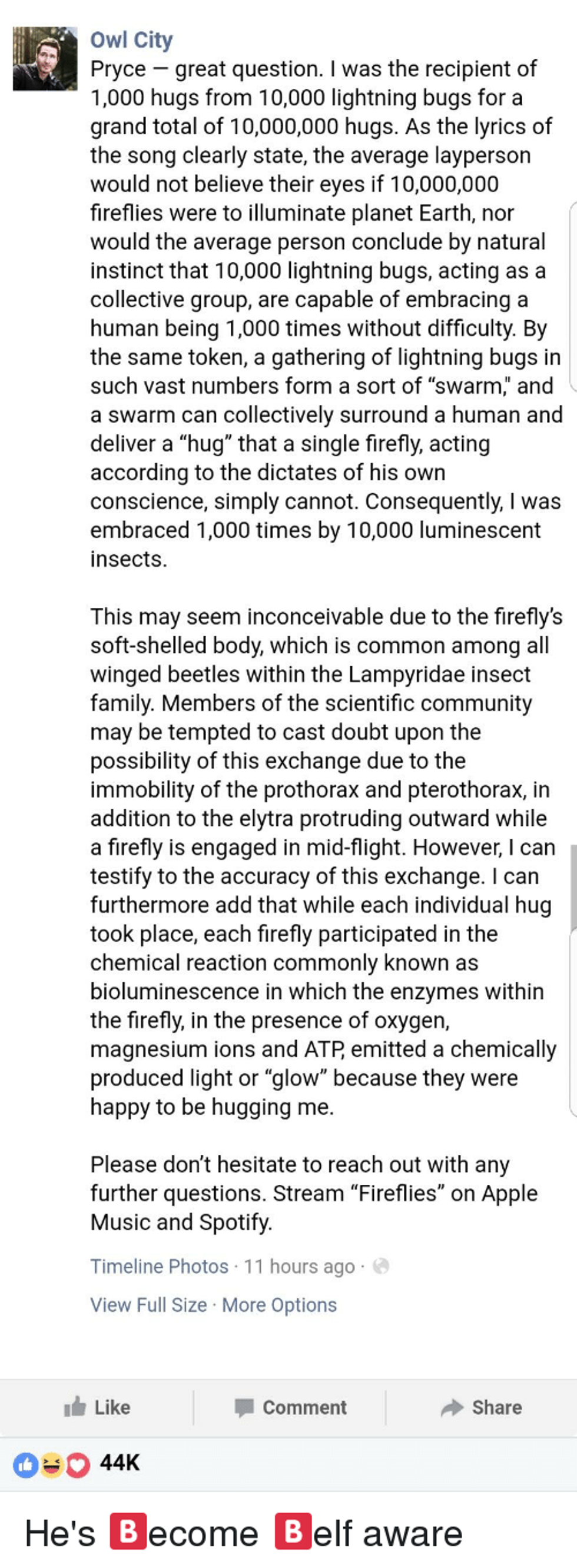If the late 2000's pop music scene produced just one mind-boggling question: how does one receive a thousand hugs from ten thousand lightning bugs? Well, if you had forgotten about it before, the Internet has most likely reminded you by now.
Just about everyone remembers the 2009 smash hit "Fireflies" by the electro-pop shy boy Adam Young, better known as Owl City. As a super fanatic of this artist in my middle school years, I often pondered that exact same question. The logistics just didn't add up; did he receive a single hug from only a fraction of the luminescent creatures, or did every single one give him exactly one thousand embraces? And besides -- how does an insect hug a person anyway?
We all know the Internet has a thing for beating dead horses, and this time around, it was this same debacle that was resurrected recently by an unknown user and became a hot debate on Twitter and other social platforms. As a result, memes regarding the song started appearing -- and it was all downhill from there.
What amazed me most about this entire fad is that there was nothing, really, that sparked it. The song itself is eight years old and rarely plays on pop radio. In fact, the only recent activity by Owl City himself is a new single dedicated to his father, entitled "Not All Heroes Wear Capes," which can be streamed from Spotify but suggests no relationship to his first radio hit.
Given this scenario, it would seem that the Internet has become one giant universe full of completely random chain reactions, the dominos falling in infinite directions constantly and without end. And in some ways, that's true. But I also like to believe that there's a more personal touch to it. After all, nothing starts moving unless a force acts upon it.
Random tidbits like this become viral for the same reason a reader may share this very article - they like it, and want others to see it too. This act, and indeed the "Fireflies" trend as a whole, is not at all random -- in fact, it is innately intentional. "Fireflies" was popular in 2009, and there is no universal law that says it cannot be popular again, or that it even ceased to be popular, even if it is seen through a different lens. It comes down to one simple fact: people like the song, or the joke, or whatever it is that the previous person has set before them. And if they are compelled to share it, the reaction continues -- a large-scale domino effect, not random but carefully thought out so that each piece hits the next.
Some on the Web have also argued that the revival of a song like this is simply due to nostalgia. Believe it or not, 2009 was eight years ago, and young children today may have no idea about how much we wanted planet Earth to turn slowly back then. If one person who tweets about this song happens to be in the right place at the right time, and a lot of people feel the same way, the ingredients are just right for a viral outbreak of nostalgia. And with a song like "Fireflies" presenting such a thought-provoking phrase, it's not hard to see how this controversy has risen once again.
In the case of the "Fireflies" fiasco, a rare event has taken place. The constant questioning has finally garnered a response from the man himself, Adam Young, who has finally decided to put to rest the controversy he sparked all those years ago. Hats off to you, Owl City - your song has survived the gauntlet of pop radio, become a viral meme, and inspired real conversation about the way people interact.
Thanks for reading - I am new to The Odyssey and this is my first article! If you enjoyed it, please share! Thanks so much!




















